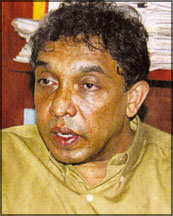Twin crises hit Sri Lankan Economy
Global economic and financial crisis and the home grown crisis have
hit the Sri Lankan economy. To get the advantages of the post crisis
recovery, Sri Lanka should be able to improve its balance of payment and
budgetary position, make a competitive and investment friendly climate
and a rapid phase of export promotion towards diversified markets, said
Dr. Sirimal Abeyratne.
 |
|
Dr. Sirimal Abeyratne |
Dr. Abeyratne a senior lecturer of the Department of Economics in the
University of Colombo was addressing the launch of Economic and Social
Survey of Asia and the Pacific 2009 survey report in Colombo last week.
We have faced a twin crisis global and domestic. Global financial and
economic crises have hit our financial sector and the real sector. Since
our financial sector is not much integrated to the world the impacts of
the financial crisis is less. We feel the indirect impacts of the global
financial crisis. Our capital account is not open and FDI is not
significantly high. The government borrowing is affected as it is open
for foreign investors. As a result foreign reserves have declined.
However, the real sector has been directly hit by the global
recession. As our real sector is integrated to the world, we experience
serious crisis. Our exports have dropped drastically because the 60 per
cent of our exports go to the most affected regions US and Europe. Our
agricultural sector is little integrated and is less affected and the
domestic food consumption too has not been affected. Locally we face the
crisis of fiscal deficit and balance of payment problems seriously. The
global economic outlook forecasts 0.9 per cent global GDP growth, 0.3
per cent contraction in high income countries and East Asia and the
Pacific a 6.5 per cent growth. Commodity prices including oil have
drastically decreased last year and still the prices are falling.
Inflation has dropped from over 20 per cent to 7 per cent and still the
domestic prices of commodities are increasing at a lower phase while
they are decreasing in the international market.
Poor performance
Sri Lanka’s trade deficit is growing since last decade because
important sectors are under-performing. Tourism sector has not grown and
tourist arrivals have not increased and the figure is still equal to the
tourist arrivals 30 years ago. Sri Lanka has failed in attracting FDI
and there is a very poor performance. Since policy reforms in 1977 our
entire accumulated FDI is only 3.5 billion. We are far behind the other
developing countries. For instance Vietnam which initiated policy
reforms much later than us gets $ 6 billion FDI annually.
Dr. Abeyratne said that Sri Lanka does not feel BOP crisis due to two
factors; foreign remittance and high government borrowing cushion the
impact. In 2007 the government has borrowed $ 1.2 billion. Our reserve
position is not satisfactory and last June we had $3.5 billion and it
has drastically declined. Our reserve position is very low compared to
other countries. In this financial crisis even some individuals lost
several billions. China fears of losing over US$ trillion it has
invested in the US and Russia hundreds of billions.
Fiscal deficit
He said that country’s fiscal deficit will increase due to three
factors. First the Government expenditure will increase because the
government has to assist the people who are vulnerable to the economic
crisis.
Second the stimulus packages have to be given to affected sectors.
Third the government will have to spend money for the rehabilitation and
reconstruction of the North and the East provinces. However, lower
import prices will ease pressure on BOP. While the expenditure is
increasing there is no way of increasing income. The government heavily
depends on tax income. The only sector that will be least affect by the
crisis or boost is the agricultural sector. However the agricultural
sector is not taxable and it depends on government subsidies. Industrial
production will be cheap but demand will remain low.
Therefore revenue side is under pressure and we have gone to the
limit before the global crisis. Dr. Abeyratne said that the agriculture
and fisheries sectors in the North and the East will boost and will
contribute positively to the economic growth.
However, he said that the agricultural sector has its own limitations
and will not be able to significantly increase the income of the people.
The sector is not attractive for youth labour.
GW
|


